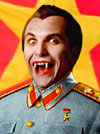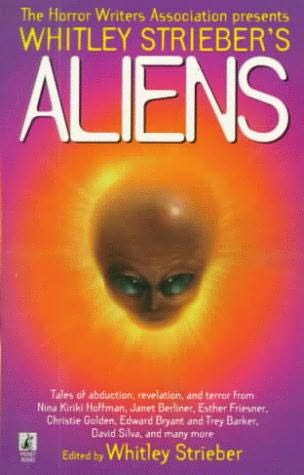|
Whitley Strieber's Aliens Book review by Thomas M. Sipos |
|
MENU Books Horror Film Festivals and Awards
Pursuits
Blogs Horror Film Festivals and Awards
Other
|
Whitley Strieber's Aliens (edited by Whitley
Strieber, Pocket Books, 1999, 459 pp.)
* In Hollow Houses, by Gary A. Braunbeck. The abused daughter of a heroin fiend is a star child come to lead the Worthy (the lame and the poor, the homeless and the meek) to inherit the Earth. Leah's discovery of her alien abilities evokes Kris Neville's "Bettyann." This novella blends grays, Christian metaphors, men in black, and New Age mysticism (there's even a crippled Indian shaman). Not bad, but nothing new.
* Radiance, by Nina Kiriki Hoffman. Sentient balls of light inhabit human corpses, ushering in a New Age of human evolution and understanding, both between interplanetary species and between two sisters. An old theme (Childhood's End) in the context of sibling rivalry, analyzing how cosmic events affect an ordinary woman. A slight tale, but well done.
* Jolene's Motel, by Esther M. Friesner. Four women hold annual meetings to recount their abduction experiences, each varying her account according to her motivation for self-delusion. An initially fun story that slowly darkens to one about domestic woes and marital violence. What could have ended on a subtle, ominous note (upon our understanding of the situation) is dragged into graphic Burning Bed terrain (which feels like a second story grafted onto the first). Unpleasant, as the author intends.
* A Last, Longing Look, by James Robert Smith. A vagrant, claiming to be an alien who inhabits people, informs a waitress that in a previous (and handsome) body he was her lover. Is this tramp a prince whose bittersweet tale evokes City Lights? Or is he a self-delusional stalker? A surprise ending reveals a third possibility.
* Even Saints and Angels, by John B. Rosenman. After losing big in Vegas, a remorseful gambler is teleported to an alien casino with better odds but higher stakes. A fun, frivolous tale leavened with a cup of poignancy, a pinch of darkness, and a final message. Ingredients for an entrée‚ served in all the finer casino hotels of The Twilight Zone.
* A Light in the Sky, by Christie Golden. An unemployed redneck pines for abduction, expecting aliens to rescue him from his fat wife and dreary job prospects. Golden's story is marred by white trash clichés, brand name dropping, and some sloppiness (referring to "Ray's bed" when she means Jimmy's), but it's also a briskly entertaining read, with an ending that's more surprising than not.
* Alien and Fugue, by Lois Tilton. A primate ethologist is recruited by the military to interrogate an alien, the lone survivor of a ship that attacked humans during first contact. A sci-fi spy thriller featuring deftly drawn minor characters, an intriguing mystery, and chilling poignancy. Very satisfying.
* The Flicker Man, by Edward Bryant and Trey R. Barker. A ghost, bent on killing her abusive father, is drawn into a black void by a lonely transdimensional explorer (is he alien? spirit? something else?). The dysfunctional family elements are drab, clichéd, and burdened with flat dialogue. But the metaphysics are intriguing and imaginative. Unfortunately, this story is more Oprah than Art Bell.
* Guessing at the Unknown, by Cindie Geddes. A single mother from a broken family chronicles her eighteen years of dysfunctional travails (from abandonment through teen pregnancy and divorce) against the backdrop of society's changing response to some stupid aliens stranded on Earth. The mom's personal confessional is masterfully interwoven with the aliens' public saga, one serving as foil for the other, until a brief conjunction of narratives effects transformative results. One only guesses the ending because events dovetail so logically. A moving tale, its unsentimental narration preventing any schmaltz.
* Scripture Girl, by Edward Lee. A cynical misanthrope picks up an oddball woman at a bar. Less a story than a vignette with a "surprise" ending: the revelation of the woman's true nature. And if you know this anthology's title, you already know what that revelation is. The scripture-quoting Ruth is an intriguing enough character for us to wish there had been more, but there isn't.
* The Threshold of Beyond, by Stephen Mark Rainey. A clinical recounting of a doomed airliner's close encounter. Story opens after the crash, interweaving forensic findings with flashbacks of the pilot's ordeal, so any suspense derives from awaiting the details. But there aren't all that many; the encounter remains an enigma. Rainey's description of aviation technology and the Providence area lends verisimilitude, though some jargon is over the layman's head.
* The Glassy Apes, by Tracy Knight. A gray from Roswell is sedated for fifty years, until a dying psychologist makes the mistake of discontinuing the Thorazine. Knight juggles many elements, less than perfectly. Opening with a potential autumn romance, then shifting to thriller, to splatterfest, to... Her pieces are forced together by whopper coincidences and ludicrous contrivances (the medical staff buys the army explanation that the gray is actually a severely retarded human suffering from hydrocephalus). Some strong scenes, but this busy tale feels incomplete and artificial.
* Nothing as It Seems, by David B. Silva. Kingston Mills residents randomly, literally, disappear before shocked townsfolk. Nobody knows how or why, or where they go. Silva's novella opens ominously, then the mystery deepens, the tension increases, the surprises mount. His efficient prose moves events quickly and maintains our interest. Only caveat is the (unnecessary) spoiler first paragraph. Eerie, spooky, original.
* Fuel, by Adam-Troy Castro. A suicide's soul is sucked into the fuel tank of a transdimensional spacecraft that runs on "despair." Amongst these despairing souls is Man's ancient enemy, the prototype for Satan. Castro interweaves several storylines, some strong insights on despair and hate, and myriad aliens, some so incomprehensible he describes them as incomprehensible. Yet his cosmic mini-epic come to a piddly conclusion. Not ironic or funny, as perhaps intended, just sophomoric and unoriginal.
* Jerusalem Syndrome, by Janet Berliner. A secular scientist visits the Holy Land and returns thinking he's a prophet for the coming "alien Messiah." Tabloids, hucksters and tourists converge, giving him his fifteen minutes. A slight tale with an old theme (Wanting To Believe). Entertaining but forgettable.
* The End of the Dream Time, by Catherine Mintz. A elder from an oral tradition recounts his village's close encounter. Time and place are revealed unobtrusively, through nicely spaced clues within his narrative. Nothing new to Weird Science fans, and the ending is less ominous than intended. But the first person voice is well handled, and the story is intriguing, spooky, and highly enjoyable.
* Realizations, by Don D'Ammassa. A linguist is recruited by the feds to interrogate the alien survivor of a crashed space ship, one who alters reality by "realizing its potential." Although the term "quantum" is never broached, the events are so reminiscent of Quarantine that reading Egan's novel helped me make sense of D'Ammassa's story. Otherwise, the alien's mode of escape might have confused me.
* A Rustle of Owls' Wings, by Thomas Smith. One man's impressionistic recounting of his abduction by "owls" with big black eyes, and his attempt to interpret its portent. Was it real or all in his head? Spooky and atmospheric.
* Fireflies, by P.D. Cacek. A tiny glowing alien momentarily reanimates the legs of a crippled girl, prompting her to catch and keep it. Despite the Spielbergian setup, Cacek admirably chooses an unexpected ending. Tense, imaginative, and bittersweet.
* A World Hushed by Snow, by Juleen Brantingham. An adult recounts his childhood snow frolic with an alien kid. Did it happen? Or was he an imaginative child influenced by his dysfunctional and flaky parents? An impressionistic reminiscence that reads as a simple vignette, but yields more with thought. Good imagery.
* After Welles, by Michael Scott Bricker.
A sequel to Welle's War of the Worlds. In 1940, while the US military combs Martian
debris for a technological edge against Hitler or a second
Martian attack, whichever comes first, an interracial New Jersey
couple fall in love. Risky, since the Purity Movement suspects
Negroes of having Martian blood. Tense, gripping, and highly
imaginative alternate history.  |
"Communist Vampires" and "CommunistVampires.com" trademarks are currently unregistered, but pending registration upon need for protection against improper use. The idea of marketing these terms as a commodity is a protected idea under the Lanham Act. 15 U.S.C. s 1114(1) (1994) (defining a trademark infringement claim when the plaintiff has a registered mark); 15 U.S.C. s 1125(a) (1994) (defining an action for unfair competition in the context of trademark infringement when the plaintiff holds an unregistered mark).font>


 This
Horror Writers Association anthology includes more sci-fi than
horror, and some New Age, suspense, splatter, and erotica.
Strieber's intro cites the "true story" of a man who denied his
brother's report of them being abducted by aliens, but then built
his home in the shape of a UFO, possibly from suppressed memories.
He suggests these stories might likewise contain a shadow of
truth...
This
Horror Writers Association anthology includes more sci-fi than
horror, and some New Age, suspense, splatter, and erotica.
Strieber's intro cites the "true story" of a man who denied his
brother's report of them being abducted by aliens, but then built
his home in the shape of a UFO, possibly from suppressed memories.
He suggests these stories might likewise contain a shadow of
truth...